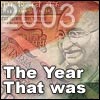Home > Business > PTI > Report
Oil companies go globetrotting
Ammar Zaidi in New Delhi |
December 26, 2003 12:00 IST
Last Updated: December 26, 2003 13:26 IST
 A year after the oil sector was deregulated with much fanfare the administered pricing mechanism or APM staged a comeback this year albeit in a different form. 2003 was a year when oil companies went globetrotting in search for oil equity and retail markets and at home the government again grabbed control as it felt morally bound to protect consumer interest in election year.
A year after the oil sector was deregulated with much fanfare the administered pricing mechanism or APM staged a comeback this year albeit in a different form. 2003 was a year when oil companies went globetrotting in search for oil equity and retail markets and at home the government again grabbed control as it felt morally bound to protect consumer interest in election year.
Almost simultaneously, an unending sparring was witnessed within the ruling National Democratic Alliance with Petroleum Minister Ram Naik's zeal to retain control over cash-rich public sector oil companies and an unrelenting Supreme Court derailing the ambitious $2 billion privatisation programme that was supposed to bring in competition in transport fuel retailing.
| Gainers and Losers |
SC verdict derails HPCL, BPCL divestment ONGC goes on acquisition spree Govt to divest 10% each in ONGC, Gail Govt freezes LPG, kerosene prices Petronet completes Dahej import terminal IOC acquires 100 petrol stations in Sri Lanka |
That privatisation of oil PSUs was not taking place in the near future was evident from the decision of the Cabinet Committee on Divestment to allow the government to sell 10 per cent stake each in Oil and Natural Gas Corporation and Gail Authority of India to the capital markets.
The reason cited was that oil scrips are at record high and the government could garner about Rs 12,500 crore (Rs 125 billion) from the two. The most remarkable part of 2003 was when India managed a quarter of stake in a producing oil field of the size of
Mumbai High, in Sudan. Besides cornering oil exploration blocks in Sudan, Libya and Syria and entering petro retailing in Sri Lanka, India also kicked off its ambitious oil security programme envisaging to build strategic oil reserves and cutting import dependence by doping ethanol from sugarcane and non-edible oil in petrol and diesel.
For a country that spends Rs 84,000 crore (Rs 840 billion) on crude oil imports, the US invasion of Iraq was bad news as it not only put the oil fields awarded to New Delhi by the Saddam Hussein regime out of its reach but also sent crude prices spiralling.
Though the transport fuel pricing was supposedly freed from April 1, 2002, the petroleum ministry sent oral dictates to oil companies not to alter the retail prices in step with the cost of crude, particularly when elections were around.
There was a complete moratorium on price change in the run up to the just concluded Assembly elections in five states.
Conscious of its middle-class vote bank, the BJP-led government froze prices of liquid petroleum gas and kerosene even though it meant that the state-run oil companies got poorer by several thousand crores of rupees for selling the two mass-consumed cooking mediums below the cost.
It is not that price hike was the only solution for keeping pace with rising cost. Import and excise duties on crude and products could have been lowered but the government preferred reverting to the time-tested policy of cross-subsidisation that was a hallmark of the APM era.
While the finance ministry stuck to not increasing the fixed subsidy of Rs 45.17 per LPG cylinder and Rs 1.63 a litre of kerosene, the state-owned oil retailing companies were asked to bear one-third of the unrealised amount.
The remaining under-recoveries were mandated to be cross-subsidised by oil and gas producers and by selling petrol and diesel slightly above the cost.
All this happened as there was no competition from the private sector. And a chance to see public monopoly end was lost in the muddle between Divestment Minister Arun Shourie and Ram Naik his counterpart in the oil ministry, over privatization of Hindustan Petroleum Corp and Bharat Petroleum Corp.
While Shourie was more than keen to see private sector firms take over the 40 per cent market share the two companies together had in the $15 billion a year petro sales, Naik raised the bogey of oil being strategic sector and stressed that private sector invests in setting up petrol stations.
The differences left the privatisation of HPCL and BPCL in suspended animation in the first half of 2003. Thereafter the apex court put the final spoke by asking the government to seek Parliament approval prior to initiating the divestment process.
Then again the control raj was at its best when it came to deregulating natural gas prices. Though natural gas pricing was to be freed from 2001-02, government refused to let go of its control this year too. The paradox was that government does not provide any subsidy on gas produced by state-owned ONGC and Oil India Ltd but expects them to sell it at below cost.
A Group of Ministers raised the ceiling price of domestic natural gas to Rs 3100 per thousand cubic meters from the current Rs 2850 per thousand cubic meters but the government refused to accept the recommendations, as five crucial states were to go to poll. The recommendation may not see the light of the day even next year as General Elections are slated before September 2004.
The gas pipeline policy saw how the government was unwilling to let go of anything to the private sector. This year, the government mandated state-run Gail, already a monopoly gas transmission company, to build a national gas grid connecting producing fields and import terminals to consumption centres all over the country.
Though the policy provided access to pipelines to all players on common carrier basis, it left virtually no scope for private sector to build efficient and cheap pipelines.
And towards the fag end of the year, the government announced untangling of the cross holding between ONGC, Indian Oil Corp and Gail. Interestingly, nearly five years ago, the Cabinet used the excuse of "synergic advantage" of a cross holding between ONGC, IOC and GAIL to raise Rs 4,643 crore (Rs 46.43 billion) to bridge the fiscal deficit. And this month, it approved in-principle the dilution of these cross holdings to the public saying the equity swaps were "too small to forge any enduring strategic alliance".
The control raj also ensured that tough entry barrier for petro retailing, like the Rs 2,000 crore (Rs 20 billion) investment criteria, remained without any relaxation. Also the government refused to share monopoly oil infrastructure like storage depots and terminals with the private sector, which delayed the latter's retailing plans in a big way.
Essar Oil Ltd and Reliance Industries Ltd made a small beginning this year opening a couple of retail outlets in Maharashtra and Gujarat.
On the positive side, ailing Mangalore Refinery and Petrochemicals Ltd got a new owner in ONGC, which this year acquired Aditya Birla Group's stake to become a vertically integrated firm. ONGC also secured a licence to set up 1100 petrol stations while the world's third largest oil firm Royal Dutch/Shell got a conditional licence for setting up 2000 petrol stations.
Public sector Petronet LNG Ltd completed construction of the Dahej import terminal where it will import LNG from Qatar. The first LNG shipment is expected in January 2004.
Shell's Hazira LNG terminal picked up pace and is slated to be completed by 2004 end. However, Britain's BG Group, following the footsteps of Total of France, withdrew from its $550 million Pipavav LNG terminal even as it got a foothold in India through acquisition of bankrupt US energy major Enron Corp's 30 per cent stake in Panna/Mukta and Tapti oil and gas field in offshore Mumbai.
ONGC, which this year began a multi-million dollar deep-sea hunt for oil and gas, acquired Scottish firm Cairn Energy Plc's stake in the 1 trillion cubic feet gas block adjacent to Reliance Industries' D6 block in the Bay of Bengal.
Elsewhere, ONGC Videsh Ltd, the overseas arm of ONGC, bought 25 per cent stake in 13 million tonnes a year Greater Nile Oil Project in Sudan and thereafter in two more oil blocks in the oil rich African nation.
It also acquired exploration blocks in Libya and Syria while Iran offered 40 per cent equity in the sprawling Azadegan oil field to get India to buy gas from it. Azadegan is Iran's biggest oil field with potential reserves of around 26 billion barrels of crude oil.
OVL, which started shipping its share of crude oil from GNOP to India, is also negotiating deals in half a dozen countries including Iran, Saudi Arabia, Kuwait and Angola.
This year, IOC became the first Indian oil firm to enter retailing overseas when it acquired 100 petrol stations in Sri Lanka.
India continued with its thrust on exploration of oil and gas and awarded 21 more blocks in the fourth round of New Exploration Licensing Policy. Unlike previous year, there were not many big hydrocarbon discoveries this year.
Reliance Industries Ltd completed exploratory drilling in its gigantic D6 field in Bay of Bengal to establish 14.5 trillion cubic feet of gas reserves. It was not lucky in western offshore where three exploratory wells ran dry.
While ONGC was on the consolidation mode, sister PSUs wanted a slice of its success. IOC and Gail made a pitched appeal for splitting the very successful OVL to realise their ambitions of becoming vertically integrated. The appeal was turned down by the oil ministry.